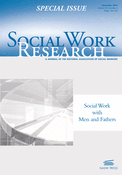-
Views
-
Cite
Cite
Cristina Mogro-Wilson, Reinaldo Rojas, Jasmin Haynes, A Cultural Understanding of the Parenting Practices of Puerto Rican Fathers, Social Work Research, Volume 40, Issue 4, 1 December 2016, Pages 237–248, https://doi.org/10.1093/swr/svw019
Close - Share Icon Share
Abstract
This study investigated the role of Puerto Rican (PR) fathers in the family and their involvement, parenting practices, and relationships with their children. Four focus groups were conducted by a bilingual interviewer with a total of 18 participants. The results indicate that parenting practices for PR fathers are heavily embedded in the cultural tenets of familismo (familism), respeto (respect), personalismo (personalism), and simpatía (sympathy or solidarity), in addition to the importance of PR pride and the cultural expectation of machismo, which functions as a sense of responsibly to the family. Social workers helping PR families must include fathers, who share child-rearing responsibilities, in any discussions. Social workers would also benefit by focusing on the importance given to close family relationships, interpersonal responsiveness, interdependence, personal dignity, and respect within PR families.





